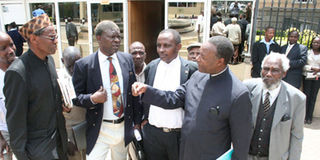Torture victims to snub truth team

Photo/FILE
Koigi wa Wamwere, Otieno Mak’Onyango, Wanyiri Kihoro, Njeru Kathangu and an activist outside the High Court on November 1, 2010 after the adjournment of a case against suspended TJRC chairman Bethuel Kiplagat.
Victims of the Nyayo House torture chambers will not testify before the truth commission until it is properly constituted, a court heard on Wednesday.
Mr Njeru Kathangu said in a sworn affidavit that the victims had no confidence in the Truth, Justice and Reconciliation Commission because it had limited powers to investigate the over 15,000 human rights violations committed during the fight for multi-party democracy.
A victim, Mr Kathangu, said only a home-grown process involving people who were there when the violations took place could reveal the truth and build confidence in the commission.
Mr Kathangu said section 10 of the commission’s Act made provision for three foreign experts, who have no background to the issues, were vulnerable to manipulation and did not add value to the reconciliation.
He was making submissions in a case in which he and four former MPs are challenging the setting up of the commission and seeking amendments to the TJRC Act.
He and Mr Kalembe Ndile, Mr Koigi wa Wamwere, Mr Otieno Mak’Onyango and Mr Moses Mwihia also want to quash the oath taken by suspended TJRC chairman Bethuel Kiplagat.
Through lawyer Mr Wanyiri Kihoro, also a Nyayo House torture chamber victim, they claim Mr Kiplagat is unsuitable to lead the team as he held positions in the government when the violations under investigations were committed.
Mr Kihoro told the court that Mr Kiplagat was very influential during former president Moi’s regime, but up to now, he has not made public any information about violations that took place.
“He should have advised the President not to appoint him to the commission,” Mr Kihoro said.
When he was detained at Nyayo House, he said, he was told that his fate would only be decided after Mr Kiplagat filed a report on his activities. He was in the cells for two months before the report was filed.
He said the truth commission would not achieve its goal if the people who knew what happened did not apologise.
“Reconciliation goes hand-in-hand with apologising, but so far, we have not heard any one publicly apologise for wrongs committed. This makes it hard to know the truth,” he said.
He said the commission should not have been given a time limit and it should have its own parameters on violations to investigate.
Hearing continues on Friday.



